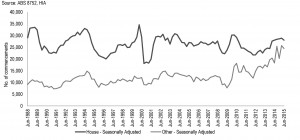The latest ABS housing figures confirm the new home building sector as the star performer of the Australian economy said the Housing Industry Association (HIA). Source: Timberbiz
“Despite a modest decline in new dwelling commencements in the June 2015 quarter, there was still a record number of 211,976 new homes started in 2014/15 – an increase of 16.9%,” said HIA Chief Economist, Dr Harley Dale.
“That is a phenomenal result which caps three consecutive years of growth for new home building – only the fifth time in the last 60 years that this feat has been achieved.
“Through its broad reach the new home building sector has delivered a strong economic dividend to Australia during a period when many other sectors of the economy have struggled.
“New dwelling commencements will fall in 2015/16, but should remain elevated at what would still be the second highest level on record.”
Mr Dale said the key to the short-term prospects for new home building is how much work in the pipeline will be converted into actual activity as it’s not coming through as quickly.
“An orderly decline in commencements in 2015/16 remains the most likely outcome. However, the credit rationing aimed at curbing investor activity is having a broad impact and risks generating a sharper fall,” he said.
The ABS figures show there were 53,314 dwellings commenced during the June 2015 quarter, a decline of 3.2% from an upwardly revised March quarter.
Detached house commencements fell by 2.9% in the June 2015 quarter to 28,046, while ‘other dwelling’ commencements declined by 4.9% to 24,482.
The profile for national dwelling commencements continues to mask large regional differences.
In the June 2015 quarter new dwelling commencements increased in South Australia (+12.0%), Tasmania (+54.0%), and the Australian Capital Territory (+76.4%). Commencements fell in New South Wales (-1.6%), Victoria (-0.5%), Queensland (-9. %), Western Australia (-10.5%), and the Northern Territory (-36.1%).








